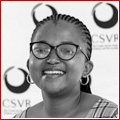Posted: 16 May, 2024 | Author: AfricLaw | Filed under: Bonolo Makgale, Matthew Ayibakuro | Tags: Constitutional Council, corruption, democratic governance, diplomatic interventions, elections, political change, political dispute, President Mack Sall, presidential elections, Senegal, social media campaign, Sovereignty, systemic change, transfer of power |
 |
Author: Bonolo Makgale
Centre for Human Rights, University of Pretoria |
 |
Author: Matthew Ayibakuro
Governance Adviser and Development Consultant |
The recent presidential elections in Senegal took place against a backdrop of constitutional disputes and widespread political fervour. This was after the Constitutional Council overturned former President Mack Sall’s decree postponing the election, declaring it unconstitutional. This election remains one of Senegal’s most historic. It signalled the end of Sall’s 12-year rule, and with 17 candidates vying to succeed him, it was the most competitive presidential race since Senegal’s independence from France in 1960. It also marked the culmination of a contentious political dispute over the date of the election, which began when Sall moved it to extend his term, sparking widespread protests and boosting support for the opposition.
Read the rest of this entry »
Posted: 13 May, 2024 | Author: AfricLaw | Filed under: Lesego Sekhu, Sinqobile Makhathini | Tags: African feminists, African women, apartheid, “face of poverty”, black women, discrimination, economic exploitation, heteropatriarchal systems, historical injustices, inequality, national oppression, post-colonial identity, racial division, South Africa, unemployment, women's rights |
 |
Author: Lesego Sekhu
Research Assistant, Centre for the Study of Violence and Reconciliation |
 |
Author: Sinqobile Makhathini
Research Assistant, Centre for the Study of Violence and Reconciliation |
As we reflect on the celebration of International Women’s Month in March and motion towards the upcoming 2024 elections, which will be held on 29 May 2024, it is a significant time to critically reflect on Black women’s citizenship and positionality in post-apartheid South Africa.
Brief history
Historically, Black people have experienced second-class citizenry within the social, economic, and political landscape of South Africa. During apartheid, racial division was the primary strategy of ‘otherness’ that was exemplified by racialised citizen status that was reserved for white races, while the Black majority were systemically excluded from the imagination of the state. Equally, gender played a role in the divisions of labour, access to resources, and experiences of systematic violence that show apartheid as equal parts racial and equal parts gendered.
Read the rest of this entry »
Posted: 10 May, 2024 | Author: AfricLaw | Filed under: Justin Monyping Ater | Tags: children’s right to education, children’s rights, climate change, climate change solutions, climate related deaths, climate resilient classrooms, closing of schools, heatwaves, human rights, South Sudan, South Sudan’s Constitution and Child Act 2008, sustainable strategies, United Nations Convention on the Rights of the Child |
 Author: Justin Monyping Ater
Author: Justin Monyping Ater
Law lecturer, School of Law, University of Juba, South Sudan
Introduction
South Sudan is increasingly becoming extremely vulnerable to climate change events such as excessive climate-induced heatwaves. Evidence suggests that this may be because the country falls under the category of the least developed Countries (LDC). These countries bear a greater burden of climate change’s adverse consequences than developed countries, yet they emit less greenhouse gases. This is because LDCs lack resources and the capacity to mitigate and adapt to climate change. The rationale also applies within a country. Each state has communities and individuals who are disproportionately vulnerable to climate change and its effects. For instance, as of 14, 15, and 16 March 2024, South Sudan’s government made considerable press releases spotlighting the disproportionate impacts of heatwaves on vulnerable groups such as children. This resulted in, for example, climate related deaths and consequently closing and re-opening of schools without strategies to keep the schools open and avoid the perpetual violation of children’s right to education. In light of this, it is argued that the government’s response of closing down schools was unsustainable. To avoid future interruption to learning, the government should adopt sustainable strategies such as the construction of climate resilient classrooms. However, in the meantime, children should be educated about climate change and its consequences to make them climate resilient. Following this introduction, the article discusses South Sudan’s obligation under international and national frameworks that provide basis for initiating and developing durable strategies to curb climate change and thereby protect children’s right to education.
Read the rest of this entry »
Posted: 8 May, 2024 | Author: AfricLaw | Filed under: Azwi Netshikulwe, Tsholofelo Nakedi | Tags: African migrants, anti-migrant sentiments, apartheid politics, Corporate Social Responsibilities, electoral advantage, false narratives, hate speech, illegal migration, misinformation, regional instability, South Africa, violence, xenophobia |
 |
Author: Azwi Netshikulwe
Researcher – Migration for Development, University of Cape Town |
 |
Author: Tsholofelo Nakedi
Community Advocacy Specialist, CSVR |
In recent years, the election period in South Africa has been a sensitive time, and it has, in some instances, exacerbated issues related to xenophobia and negatively impacted social cohesion within communities. This takes place within the context of a country like South Africa that has struggled with a culture of violence, which has its historical roots stemming from colonial and apartheid politics of divide and rule. Consequently, issues related to identity, race, and nationality often surface during election periods, leading to tensions and potential outbreaks of xenophobia. For example, political parties sometimes use divisive language and scapegoating tactics to rally their base and gain electoral advantage. In most cases, this political discourse includes blaming foreigners for unemployment, crime, or other social problems, which can stoke xenophobic sentiments among the South African populace. This is exemplified by the use of xenophobic rhetoric in certain party manifestos, where leaders prioritise addressing illegal migration.
Read the rest of this entry »





 Author: Justin Monyping Ater
Author: Justin Monyping Ater
